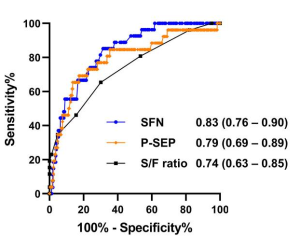A group from Division of Medical Safety Science, National Institute of Health Sciences, Japan, etc. has reported that stratifin (SFN) and presepsin (P-SEP) could be used as prognostic biomarkers for severe COVID-19 progression.
https://www.ncbi.nlm.nih.gov/pmc/articles/PMC9188980/
COVID-19 is a respiratory disease with a wide range of manifestations, from asymptomatic to severe cases with ARDS.18 Although about 80% of patients with COVID-19 experience only mild or moderate symptoms and have a favorable prognosis, the remaining patients worsen to severe or critical stage, and their prognosis, largely driven by severe ARDS, is poor. Therefore, early detection of the severe COVID-19 cases is important.
In the present study, five biomarkers for lung injury, SP-D, KL-6, P-SEP, KAL and SFN were analyzed, all of which have been suggested to be related with ARDS or its typical histological pattern diffuse alveolar damage (DAD), in serum samples collected serially from patients with COVID-19. It was found for the first time that serum SFN was significantly elevated in patients with severe COVID-19 compared to patients with mild or moderate symptoms. SFN, as well as P-SEP which has been suggested as a biomarker for severe COVID-19.
Both serum SFN and P-SEP were obviously elevated at the pre-severe stage. The AUC values [95% CI] of these proteins in diagnosing the pre-severe stage were 0.83 [0.76–0.90] for SFN and 0.79 [0.69–0.89] for P-SEP. When the cutoff values of SFN and P-SEP for discriminating the pre-severe condition from the mild/moderate condition on COVID-19 patients were set at 0.81 ng/mL and 374 pg/mL, the diagnostic sensitivity and specificity were 81.5% and 70.1% for SFN, and 76.9% and 71.9% for P-SEP, respectively.

